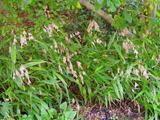Native Plants

Q. Who is Mr. Smarty Plants?
A: There are those who suspect Wildflower Center volunteers are the culpable and capable culprits. Yet, others think staff members play some, albeit small, role. You can torture us with your plant questions, but we will never reveal the Green Guru's secret identity.
Did you know you can access the Native Plant Information Network with your web-enabled smartphone?
Ask Mr. Smarty Plants is a free service provided by the staff and volunteers at the Lady Bird Johnson Wildflower Center.

rate this answer
Saturday - December 15, 2007
From: Pearland, TX
Region: Southwest
Topic: Grasses or Grass-like
Title: Grasses for dry bottom detention ponds
Answered by: Nan Hampton
QUESTION:
I am working on a project for my HOA in order to reduce mowing costs and to beautify our neighborhood. We were wondering if you could help us find people knowledgeable about dry bottom detention ponds and grasses that could be used that were slow growing, required little fertilizer but could have a strong enough root structure to maintain the slopes of a detention pond(s). We are located in Pearland, TXANSWER:
Please see our National Suppliers Directory for information about Landscape Professionals and Environmental Consultants in your area who might be knowledgeable about dry bottom detention ponds.Grasses are excellent plants for stabilizing slopes because of their extensive fibrous root systems and native grasses require no, or very little, fertilizer. If the detention pond is in a primarily sunny area, then an excellent choice for a grass is Bouteloua dactyloides (buffalograss) since it grows slowly and doesn't require frequent mowing. However, it will not deal well with standing water which may happen with your detention pond. You would probably be better off with plants that are appropriate to a raingarden situation—plants that tolerate standing in water but can also thrive when the water dries up completely. Sedges (such as Carex blanda (eastern woodland sedge), Carex cherokeensis (Cherokee sedge) or Carex texensis (Texas sedge)) are grasslike, don't grow too tall, and can withstand both wet and dry situations.
You might also consider ornamental grasses that are pleasing to look at without needing to be mowed, for instance:
Andropogon glomeratus (bushy bluestem), Chasmanthium latifolium (Inland sea oats), and Muhlenbergia capillaris (Gulf muhly).
You can see other suggestions for raingarden plants in the answer to a previous question.
More Grasses or Grass-like Questions
Foundation Plants for Leander, TX
June 05, 2015 - Looking for suggestions for a narrow bed 2-3 ft. wide, 32 ft. long against my house. Full evening sun with morning shade. Considering Salvia greggii with some type of companion plants/grasses ...
view the full question and answer
Non-allergenic landscape in Fairfield, CT
April 18, 2009 - I live in Fairfield, CT and need to have a non-allergenic landscape. Can you please list plants, ground covers, and trees/shrubs that would be beautiful, and help in this critical situation? The lan...
view the full question and answer
Native aparejograss and Water-cress at a spring in Horeshoe Bay TX
February 24, 2012 - AT a small spring that seeps from a rocky hill on my ranch near Austin, a stringy grass called aparejograss has replaced the watercress that used to be there. Should I be worried? Does the appearance...
view the full question and answer
Replacing St. Augustine grass from Dallas TX
April 10, 2014 - Dear Mr. Pants, we are replacing dying St. Augustine grass in a small, sunny back yard with ground cover. What are your recommendations for a drought-tolerant evergreen ground cover? We will till a...
view the full question and answer
Native Indiangrass as a hedge
December 13, 2009 - Hi Mr. Smarty Plants,
I would like to create a grass hedge as a foundation planting for a portion of our garden. One side of the planting is a concrete sidewalk to our garden shed, the other side wil...
view the full question and answer
| Support the Wildflower Center by Donating Online or Becoming a Member today. |

